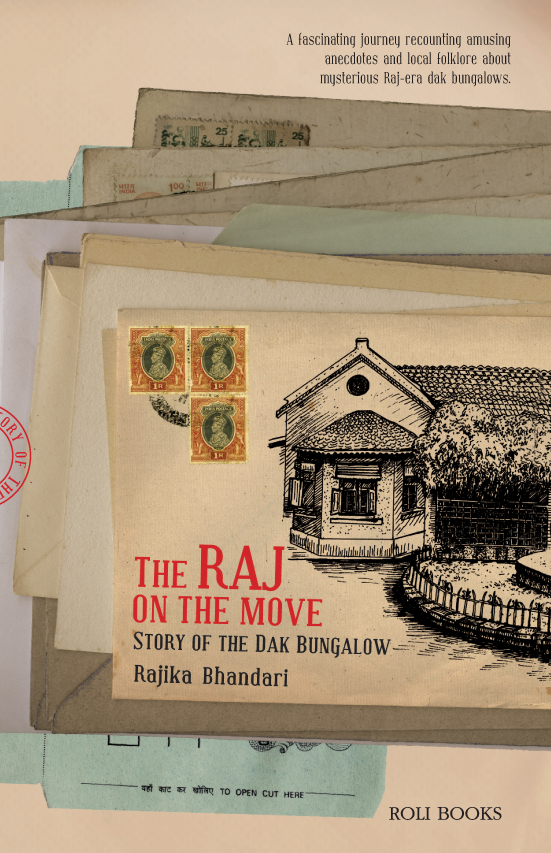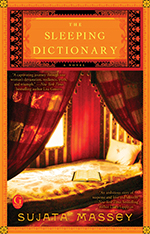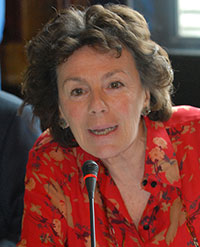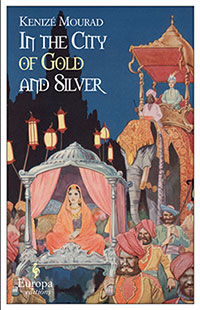|
| |
| FIRST ANNUAL IAAC LITERARY FESTIVAL |
in collaboration with The South Asia Institute,
Columbia University and India Abroad
NOVEMBER 7-9, 2014
|
|
|
November 8th -
Session 1B
Unpacking the empire: Colonial histories & modern interpretations
Moderated by Angana Chatterji |
 |
Rajika Bhandari
The Raj On The Move – Story of the Dak Bungalow |
 Rajika Bhandari, writer and researcher, is the author of the nonfiction historical and travel book, The Raj on the Move: Story of the Dak Bungalow. Her writing has appeared in National Geographic Traveler, Passion Fruit: A Women’s Travel Journal, India Currents magazine, Man’s World magazine, InCulture Parent, The Guardian, The Chronicle of Higher Education, Times Higher Ed, and The Huffington Post. Rajika is also the author of five books on international education, including two on Asia. Originally from New Delhi, India, she currently lives in New York City. Rajika Bhandari, writer and researcher, is the author of the nonfiction historical and travel book, The Raj on the Move: Story of the Dak Bungalow. Her writing has appeared in National Geographic Traveler, Passion Fruit: A Women’s Travel Journal, India Currents magazine, Man’s World magazine, InCulture Parent, The Guardian, The Chronicle of Higher Education, Times Higher Ed, and The Huffington Post. Rajika is also the author of five books on international education, including two on Asia. Originally from New Delhi, India, she currently lives in New York City. |
| |
| Synopsis |
 In The Raj on the Move: Story of the Dak Bungalow, Rajika Bhandari weaves together history, architecture, and travel to take us on a fascinating journey of India's British-era dak bungalows and circuit houses, following, quite literally, in the footsteps of travellers who stayed in these bungalows over the past two centuries. Her search takes her from the early-19th century memoirs and travelogues of British memsahibs, to travelling from the original colonial outpost of Madras in the south to the deep interiors of Madhya Pradesh, the heart of British India. Evoking the stories of Rudyard Kipling and Ruskin Bond, and filled with fascinating tidbits and amusing anecdotes, the book unearths local folklore about these remote and mysterious buildings, from the crotchety khansamas and their delectable chicken dishes to the resident ghosts that still walk the halls at night. In The Raj on the Move: Story of the Dak Bungalow, Rajika Bhandari weaves together history, architecture, and travel to take us on a fascinating journey of India's British-era dak bungalows and circuit houses, following, quite literally, in the footsteps of travellers who stayed in these bungalows over the past two centuries. Her search takes her from the early-19th century memoirs and travelogues of British memsahibs, to travelling from the original colonial outpost of Madras in the south to the deep interiors of Madhya Pradesh, the heart of British India. Evoking the stories of Rudyard Kipling and Ruskin Bond, and filled with fascinating tidbits and amusing anecdotes, the book unearths local folklore about these remote and mysterious buildings, from the crotchety khansamas and their delectable chicken dishes to the resident ghosts that still walk the halls at night.
|
|
| |
Sujata Massey
The Sleeping Dictionary |
 Sujata Massey is the author of 12 books published in 15 countries. Born in England to parents from India and Germany, she grew up mostly in Saint Paul, MN. After graduating from the Johns Hopkins University, Sujata worked for five years as a newspaper journalist at the Baltimore Evening Sun before marrying and moving to Asia to begin her dream career as a novelist. Sujata's mystery series set in Japan and featuring the sleuth Rei Shimura has won the Agatha and Macavity awards and been shortlisted for the Edgar, Anthony and Mary Higgins Clark awards. In 2013, Sujata's first historical novel set in India, The Sleeping Dictionary, was published in the United States. Foreign rights were sold to publishers in India, Italy and Turkey. BOOKLIST called it "an utterly engrossing tale of love, espionage, betrayal and survival...historical fiction at its best." Sujata Massey is the author of 12 books published in 15 countries. Born in England to parents from India and Germany, she grew up mostly in Saint Paul, MN. After graduating from the Johns Hopkins University, Sujata worked for five years as a newspaper journalist at the Baltimore Evening Sun before marrying and moving to Asia to begin her dream career as a novelist. Sujata's mystery series set in Japan and featuring the sleuth Rei Shimura has won the Agatha and Macavity awards and been shortlisted for the Edgar, Anthony and Mary Higgins Clark awards. In 2013, Sujata's first historical novel set in India, The Sleeping Dictionary, was published in the United States. Foreign rights were sold to publishers in India, Italy and Turkey. BOOKLIST called it "an utterly engrossing tale of love, espionage, betrayal and survival...historical fiction at its best." |
| Synopsis |
 Bengal, 1930.Young Pom's life changes forever when her family is wiped out in a devastating flood. She becomes a maidservant in British boarding school where she\'s given a new name discovers her gift for languages. Amidst the drudgery of her duties, she finds unexpected friendship and experiences stirrings of first love. However, tragedy strikes, and Pom escapes to the railway town Kharagpur, where her dreams of love and learning are nearly dashed. On the eve of World War II, she reaches Calcutta, the city of palaces, where India's struggle for freedom mirrors her own. Bengal, 1930.Young Pom's life changes forever when her family is wiped out in a devastating flood. She becomes a maidservant in British boarding school where she\'s given a new name discovers her gift for languages. Amidst the drudgery of her duties, she finds unexpected friendship and experiences stirrings of first love. However, tragedy strikes, and Pom escapes to the railway town Kharagpur, where her dreams of love and learning are nearly dashed. On the eve of World War II, she reaches Calcutta, the city of palaces, where India's struggle for freedom mirrors her own.
|
| |
|
| |
Kenize Mourad
In the City of Gold and Silver |
 Kenizé Mourad is a French journalist, foreign affairs and war correspondent, historian, and novelist. The orphaned daughter of the Turkish Ottoman princess Selma (a grand-daughter of Sultan Murad V), she was separated during World-War II as an infant child from her Indian Muslim father, the late Rajah of Kotwara, and was raised in Paris by foster parents and Catholic nuns. A bestselling author of international repute, her latest book “In the City of Gold and Silver” will be released in the United States on November 4, 2014. Kenizé Mourad is a French journalist, foreign affairs and war correspondent, historian, and novelist. The orphaned daughter of the Turkish Ottoman princess Selma (a grand-daughter of Sultan Murad V), she was separated during World-War II as an infant child from her Indian Muslim father, the late Rajah of Kotwara, and was raised in Paris by foster parents and Catholic nuns. A bestselling author of international repute, her latest book “In the City of Gold and Silver” will be released in the United States on November 4, 2014. |
| |
| Synopsis |
 The story of Begum Hazrat Mahal, who in I857 paved the way to the
liberation of India, is not only an historical epic, it highlights contemporary burning issues. The story of Begum Hazrat Mahal, who in I857 paved the way to the
liberation of India, is not only an historical epic, it highlights contemporary burning issues.
Kenize’ Mourad 's new novel, “In the city of gold and silver” is the fascinating and little known story of an Indian woman, a Muslim queen.
who led the first revolt against the British Raj in 1857. during the famous Sepoy Rebellion, almost a century before the Indian Independence.
In the 19" century when the British ruled over most of India, the state of Awadh was still independent; in its capital, Lucknow, called “The city of gold and silver“ for its beauty and wealth, the different religious communities coexisted in harmony. In 1856 the British decided to exile the King, under the false pretext of his immorality in order to annex Awadh.
The people revolted and Hazrat Mahal, the fourth wife of the king, then only 26 years old, left the sheltered walls of purdah to become one of the main leaders of the revolt. With Rajah Jai Lal Singh and the sepoys, she confronted the powerful British army for two years, to become a legend...
A rich historical saga, carefully documented, “In the city of gold and silver“ is a monumental narrative which portrays a gracious, tolerant
civilization gone forever, but whose roots remain.
Significantly, the account is a highly relevant book that echoes some of
the most critical international issues of today: the causes of the rise of
extremism in lieu of a liberal, moderate Islam and its confrontation
with the West; the difficult relations between religious communities;
and the misunderstood status of Muslim women as set in the Koran
versus how it has been too often misinterpreted throughout the ages.
|
| |
|
| |
| Angana Chatterji
|
 Angana P. Chatterji is Co-chair, Armed Conflict Resolution and People’s Rights Project at the Center for Nonprofit and Public Leadership, Haas School of Business, University of California at Berkeley. (nonprofit.haas.berkeley.edu/research/acr.html) Dr. Chatterji’s scholarship bears witness to postcolonial conditions of grief, dispossession, and agency. A cultural anthropologist and human rights specialist, Dr. Chatterji focuses her scholarly work on issues of gendered violence and reparatory justice; nationalism and minoritization; religion in the public sphere and religious freedom; and livelihood security and cultural survival. Dr. Chatterji has served on human rights commissions and offered expert testimony, including at the United Nations, European Parliament, United Kingdom Parliament, and United States Congress. In Kashmir, Chatterji co-founded, and was co-convener of (in 2008-2012), the People’s Tribunal on Human Rights and Justice. In 2005, Chatterji founded the People’s Tribunal on Religious Freedom and Human Rights in Odisha. In 2004, Chatterji served on a two-person independent commission on displacement and rehabilitation in the Narmada Valley. In 1984, Chatterji worked in the relief camps for Sikh victims-survivors in Delhi. In 2003-2004, Chatterji was a founding member of the South Asia Feminist Preconference at the University of Wisconsin, Madison. Chatterji served on the faculty in the Department of Social and Cultural Anthropology at the California Institute of Integral Studies, where she co-created a graduate curriculum in postcolonial anthropology as Professor (2009-2011), Associate Professor (2000-2009), and Adjunct Professor (1997-2000). Between 1989-2002, Chatterji worked with the Indian Social Institute and Planning Commission of India, and as the Director of Research at the Asia Forest Network, initially housed at the University of California, Berkeley. Chatterji’s publications include: Violent Gods: Hindu Nationalism in India’s Present; Narratives from Orissa (Three Essays Collective, 2009); Land and Justice: The Struggle for Cultural Survival (forthcoming); a co-edited volume, Contesting Nation: Gendered Violence in South Asia; Notes on the Postcolonial Present (Zubaan, 2012; U. Chicago, 2013); a co-contributed anthology, Kashmir (Verso, 2011); and reports for which she was lead author, entitled, BURIED EVIDENCE: Unknown, Unmarked, and Mass Graves in Kashmir (2009) and Without Land or Livelihood (2004). Angana P. Chatterji is Co-chair, Armed Conflict Resolution and People’s Rights Project at the Center for Nonprofit and Public Leadership, Haas School of Business, University of California at Berkeley. (nonprofit.haas.berkeley.edu/research/acr.html) Dr. Chatterji’s scholarship bears witness to postcolonial conditions of grief, dispossession, and agency. A cultural anthropologist and human rights specialist, Dr. Chatterji focuses her scholarly work on issues of gendered violence and reparatory justice; nationalism and minoritization; religion in the public sphere and religious freedom; and livelihood security and cultural survival. Dr. Chatterji has served on human rights commissions and offered expert testimony, including at the United Nations, European Parliament, United Kingdom Parliament, and United States Congress. In Kashmir, Chatterji co-founded, and was co-convener of (in 2008-2012), the People’s Tribunal on Human Rights and Justice. In 2005, Chatterji founded the People’s Tribunal on Religious Freedom and Human Rights in Odisha. In 2004, Chatterji served on a two-person independent commission on displacement and rehabilitation in the Narmada Valley. In 1984, Chatterji worked in the relief camps for Sikh victims-survivors in Delhi. In 2003-2004, Chatterji was a founding member of the South Asia Feminist Preconference at the University of Wisconsin, Madison. Chatterji served on the faculty in the Department of Social and Cultural Anthropology at the California Institute of Integral Studies, where she co-created a graduate curriculum in postcolonial anthropology as Professor (2009-2011), Associate Professor (2000-2009), and Adjunct Professor (1997-2000). Between 1989-2002, Chatterji worked with the Indian Social Institute and Planning Commission of India, and as the Director of Research at the Asia Forest Network, initially housed at the University of California, Berkeley. Chatterji’s publications include: Violent Gods: Hindu Nationalism in India’s Present; Narratives from Orissa (Three Essays Collective, 2009); Land and Justice: The Struggle for Cultural Survival (forthcoming); a co-edited volume, Contesting Nation: Gendered Violence in South Asia; Notes on the Postcolonial Present (Zubaan, 2012; U. Chicago, 2013); a co-contributed anthology, Kashmir (Verso, 2011); and reports for which she was lead author, entitled, BURIED EVIDENCE: Unknown, Unmarked, and Mass Graves in Kashmir (2009) and Without Land or Livelihood (2004).
|
|
| |
|
|

